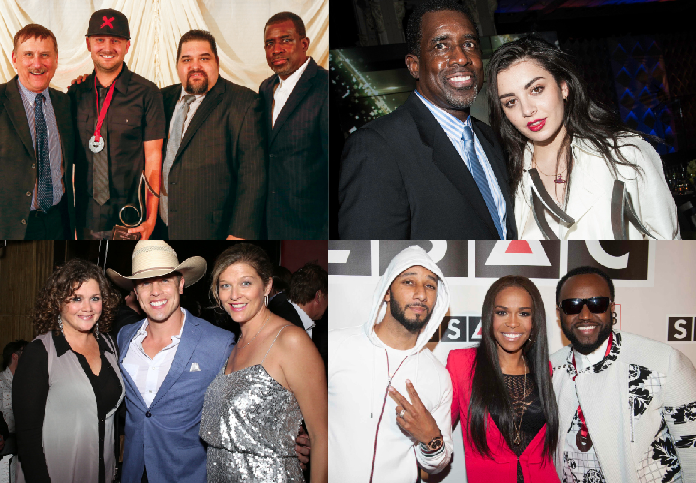
While Performance Rights Organization SESAC has been around for over 80 years, its venture into songwriting royalties has been unique. Founded as a way for European publishers to receive royalties in America, the company didn’t begin accepting songwriter contracts until 1970. Over the years it has progressed from Contemporary Christian formats, to R&B, hip-hop, country, to now handling all genres including film/TV composers.
In this exclusive interview, Music Connection sat down with SESAC’s Senior VP, Writer/Publisher Relations, Trevor Gale, to discuss the importance of PRO education, the differences between the three major PROs and why SESAC chooses to remain a smaller PRO (36,000+ members) unlike its American competitors (who average over 600,000 members). Note: Before joining SESAC, Gale was a prominent producer, songwriter, drummer (Aretha Franklin, Whitney Houston, Run DMC).
By Andy Mesecher
Music Connection: According to Sesac.com, the PRO focuses on advanced technology for its songwriters.
Trevor Gale: Yes. We pride ourselves in pushing [innovation] as a goal. We have a few projects that we are soon to unveil which will demonstrate those goals. We’ve tracked with [Broadcast Data Systems] for many years and we were early [adopters of] direct deposit.
We’re working really hard to stay ahead of the curve. In the meantime we are in the garage tinkering and throwing wrenches over our shoulders on some innovative new things that we will soon unveil. We do a lot of things to make life easy for our clients/writers. They can register their songs online, handle e-applications, direct deposits, etcetera.
MC: Doesn’t SESAC also offer monthly payouts, versus the quarterly norm?
Gale: Songwriters can opt-in for monthly payments if their songs are radio based. Some of our writers still prefer the quarterly system, [so we have both]. We’ll be rolling that out across all formats soon. Currently it’s just for our writers in radio activity (whether it be pop songs, R&B, country, etc.) and not so much our television writers.
MC: What differentiates SESAC from other PROs?
Gale: We pay faster than ASCAP and BMI. At the worst it’s one quarter [earlier]. We strive to make our payouts a little bit [higher as well]. We can’t be the smallest of the three American rights organizations and pay less. So we endeavor every day to make sure that we’re paying a little bit more.
We also pride ourselves in the ability to give a lot more personalized attention. When it comes to knowing what my writers sound like, get to their shows, etcetera, I think we trump ASCAP and BMI on that. You are able to get somebody on the phone more readily here.
MC: Is it free for a songwriter to join SESAC?
Gale: Yes it is. Traditionally we’ve had the stipulation that we either need to hear your music or are recommended. That’s helped us keep our exclusivity, so to speak. We don’t keep the exclusivity to [turn off songwriters], we try to keep the level of writers that we work with at a certain height. We want writers who are very serious about what they’re doing and are professionally minded about their craft. That’s what keeps us able to give personalized attention to feature them in our publications, on our websites and be in touch with them.

MC: Do different PROs offer higher payouts for varying genres?
Gale: I can’t really say because the rates are consistently moving around. But in a very large general sense, SESAC endeavors to pay better than ASCAP and BMI. We actually end up, in many instances across many different genres/formats, paying better. Even though the percentage we collect may be smaller, because of the size of clientele we represent, we are able to do a pretty decent job at providing an adequate payout.
Of course, every once in a while ASCAP rates may change a little bit and they’re paying more than we are in a certain genre, or it moves for BMI in a certain genre. But we have a very mindful finance department who are looking to make sure we are always competitive with respect to payouts. I couldn’t say to you, “Yes, in country music we pay 10 times more,” but I know across the board our payments are extremely competitive with BMI/ASCAP. We couldn’t stay in business for 80+ years if we were not doing that.
MC: Who should attend SESAC’s yearly Bootcamp?
Gale: All writers who are seeking to improve their knowledge base of this ever-shifting industry should attend Bootcamp. A Dr. Luke—even though we don’t represent Dr. Luke—could get away with skipping it (laughs). But if you’re working to be on a similar level, Bootcamp is a great thing. It is a full course of education and information that we cram into one day. We cover things like music publishing, film/TV music, songwriter advice (including spiritual advice not just direct songwriting advice). It is a great platform from beginners all the way to advanced writers.
MC: What is SESAC EDU?
Gale: We put together some materials for educators across the country [to inform students about PROs]. We believe that a professional songwriter might be in his/her late 20s, but they didn’t start that way. They began probably as a teenager or younger and that knowledge/information/education on how things work is very important.
I talk to songwriters every single day, and every time a new songwriter comes to me, they tell me a version of the truth about the business that is somehow or another warped. “I can just sing this song and because I sang it, it is copyrighted, right?”….“NO!”
So we have put a premium on educating young people from an early stage in their career where they are really still trying to figure it all out. We want to make sure that even if they go to ASCAP or BMI, we want them to understand how the business works. … The educated songwriters are the best songwriters: They understand what to do, how the money flows, etcetera. It makes their lives and our lives better and easier.
MC: Specifically with your personal musical history, how does that play a role in what you do with SESAC?
Gale: I am honored and thankful that God has given me the chance and opportunity to make music and participate in the music business before I got to SESAC as a creative person. It’s helped me so much in understanding who songwriters are as people. In our line of work, the commodity is people. The product that we represent is songs, but they come directly from people. The people hold them dear.
I thank God I have the ability to understand who they are as people and what they’ve been through in order to share those great songs/emotional masterpieces with the world. Being able to look at it from that perspective and not just, “Yes, what percentage of the song did you write? Okay we’ll get your check in an hour and a half, blah blah blah.” That’s all important and key, but the first thing is to understand that this is their life that you’re dealing with and talking about.
MC: Creative people don’t necessarily trust people with suits on, traditionally.
Gale: “The suits.” It’s important for [songwriters] to get the feeling that this person from SESAC knows what I’m talking about and understands what I’ve gone through to get these two songs on Adele’s new album. I think [songwriters] actually get that and respect it, which makes them more comfortable entrusting their music, their lives, their careers with that company.
Sometimes you hear a song and you think this artist came out of nowhere and made a hit record. But this person has lived at the YMCA, on an ex-bf’s couch, got thrown out of their house because their father hated music––it’s a lot to know, what went into creating that music.
Contact SWilliams@SESAC.com
Top Left photo: John Mullins; Jason Ingram; Tim Fink; and Trevor Gale at the 2013 SESAC Christian Music Awards
Top Right photo: Trevor Gale with artist/songwriter Charli XCX who was named Songwriter of the Year at SESAC’s 18th Annual Pop Music Awards. Charli XCX also won Song of the Year honors for “I Love It”
Bottom Left photo: Juli Newton Griffith; Dustin Lynch; and Shannan Hatch at SESAC’s 4th Annual ACM Awards after party
Bottom Right photo: Swizz Beatz; Michelle Williams; and Rico Love at SESAC’s 2013 Pop Awards








